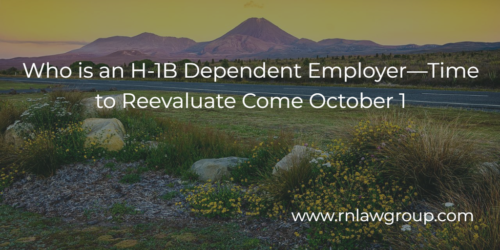
Who is an H-1B Dependent Employer—Time to Reevaluate Come October 1
As we get closer to October 1 and companies are set to gain new H-1B employees, it is important for companies to reevaluate if they are now an H-1B dependent employer or not. Being an H-1B dependent company can fluctuate as a company’s workforce fluctuates, but it is most common on October 1 of each year. Dependency must be determined either at the time of the filing of the LCA or at the time of filing the H-1B petition.
The Department of Labor (DOL) has strict regulations on what is an H-1B dependent employer, and it really is based on the number of employees and the number of employees on H-1B. An employer can be H-1B dependent if:
- It has 25 or fewer full-time-equivalent employees who are employed in the United States and employees more than seven H-1B non-immigrant employees; or
- It has at least 26 but not more than 50 full-time-equivalent employees who are employed in the United States and employees more than 12 H-1B nonimmigrants; or
- It has at least 51 full-time-equivalent employees who are employed in the United States and employees H-1B nonimmigrants in a number that is equal to at least 15 percent of the number of such full-time-equivalent employees.
The regulations also define what is considered an “employer” for purposes of determining H-1B dependency status. It states that “any group treated as a single employer under the Internal Revenue Code (IRC) at 26 U.S.C. § 414(b), (c), (m), or (o) shall be treated as a single employer for purposes of the determination of H-1B dependency.” See 20 C.F.R. § 655.746(b). The regulations go on to stated that all employees “within a controlled group of corporations” will be treated as employees of a single employer. This includes a parent-subsidiary-controlled group, a brother-sister-controlled group, or a combined group.
Determining H-1B dependency is important as employers have certain obligations pursuant to the Labor Condition Application (LCA) regulations if they are H-1B dependent. There are three attestations that H-1B dependent employers must attest to on the LCA:
- Employer Displacement – The employer has not displaced a U.S. worker within 90 days before or after an H-1B visa petition;
- Secondary Employer Displacement – The employer will not place any H-1B worker at a secondary employer’s work site unless the employer first makes a bona fide inquiry as to whether the secondary employer has displaced or intends to displace a similarly employed U.S. worker within 90 days before or after the placement of the H-1B worker; and
- Recruitment efforts – the employer took good faith steps to recruit U.S. workers for the job for which the alien worker is sought, at wages at least equal to those offered to the H-1B worker.
An H-1B dependent employer must comply with those requirements and make those attestations on the LCA, unless they are exempted from these requirements. An H-1B dependent employer can be exempt from the H-1B dependent attestations if they are hiring an H-1B worker who is paid at least $60,000 per year or holds a master’s degree or higher in a specialty related to the employment. If the H-1B worker meets one or both of the requirements, the employer may opt to be exempt from the additional requirements as long as the exemption is noted both on the LCA and the I-129 for the employee.
The DOL routinely audits LCAs for companies and will look for issues. It is important that when you are hiring employees to ensure you have updated your H-1B dependent status and are complying with the regulations.
By: Steven Brown
Steven Brown is a Partner at Reddy Neumann Brown PC where he works in the Non-immigrant visa department and leads the Litigation Team. His practice covers all phases of the non-immigration visa process including filing H-1B, L-1, E-3, H-4, and H-4 EAD petitions. In the last two years, Steven has successfully handled over 1,000 non-immigrant visa petitions including filing petitions, responding to any necessary Requests for Evidence, and drafting motions and appeals. He has also become a key resource for F-1 students that seek guidance on properly complying with the F-1 visa regulations and any OPT or CPT issues they may have. Additionally, Steven holds a weekly conference call for companies that are part of one of the largest organizations for IT Services companies in America.
Reddy & Neumann has been serving the business community for over 20 years and is Houston’s largest immigration law firm focused solely on US. Employment-based immigration. We work with both employers and their employees, helping them navigate the immigration process quickly and cost-effectively

